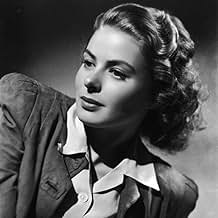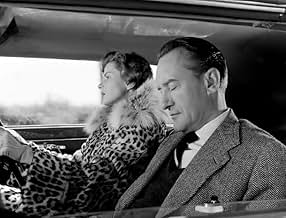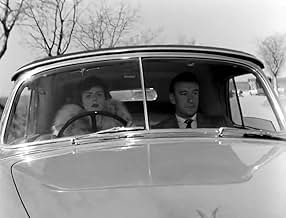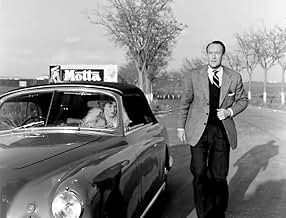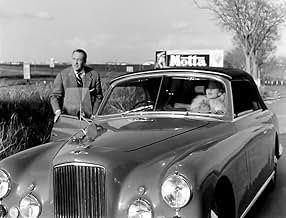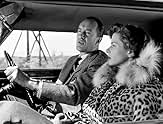AVALIAÇÃO DA IMDb
7,3/10
13 mil
SUA AVALIAÇÃO
Um casal viaja a Nápoles e se dá conta da crise em que se encontra seu casamento.Um casal viaja a Nápoles e se dá conta da crise em que se encontra seu casamento.Um casal viaja a Nápoles e se dá conta da crise em que se encontra seu casamento.
- Direção
- Roteiristas
- Artistas
- Prêmios
- 3 vitórias no total
George Sanders
- Alex Joyce
- (as Georges Sanders)
Maria Mauban
- Marie
- (as Marie Mauban)
Anthony La Penna
- Tony Burton
- (as Leslie Daniels)
Natalia Ray
- Natalie Burton
- (as Natalia Rai)
Bianca Maria Cerasoli
- Un'amica di Judy
- (não creditado)
Adriana Danieli
- Un'amica di Judy
- (não creditado)
María Martín
- Judy
- (não creditado)
Lyla Rocco
- La signora Sinibaldi
- (não creditado)
Avaliações em destaque
The death of her uncles brings married couple Catherine and Alex to Naples in order that they might handle the sale of their inherited villa. From the first journey they make together, there is a real frost in the air and an apparent lack of love between them. After several difficult nights together where they acknowledge the tenuous state of their relationship and decide to use the holiday to spend time apart as opposed to being alone together. As Catherine heads off to catch up on the history and museums of the area while Alex idles around Capri, flirting and enjoying the friendly company of the young ladies he meets there.
It has been said that not a great deal happens in this film and those that say this are mostly correct but they are not being critical of this fact, merely stating it. The basic plot is: couple comes to Italy with marriage problems and, in between fights, travel around the area and that's about it in terms of definable action. However to simply leave it at that is to do this film a great injustice because so much of it is about more than just what is happening at any given moment and it is actually a beautifully shot and moving story of love within marriage. We join the story where Catherine and Alex (in a very well drawn marriage) have both come to the conclusion that their marriage must nearly be over. Neither really wants that but neither can manage to make things change; frustrated they go off and travel around Naples alone.
At this point the film balances two aspects with real skill. On one hand the film is a really intimate travel film, not just focusing on the sweeping scenery of the region but getting closer, looking at the specific histories, sites of interest and the people that reside there. Its strength is that it is never just about this because the scenery is just the backdrop for the two characters to discover themselves undergoing soul searching but in a casual manner, not a heavy, gut wrenching fashion, more of a dawning realisation than anything else. This is subtly down and all the better for it; a convincing marriage that has been worn away to the point that the couple have simply forgotten to just be in love and instead have allowed other aspects of their relationship (the sarcasm, the niggling, the familiarity) to become the main part of their daily interactions. Those who have not been married or in a long-term relationship may not 'get' this film but I can assure you that it will likely be recognisable to you if you have been.
The chemistry between Sanders and Bergman is very convincing I felt like there had been love between them but it had just been forgotten. Individually they both played their parts really well there was no real 'eureka in the bathtub' moment until the end but, up till then, we had seen both the characters pick up little things along the way in a very able manner. The support cast were all good trimming round the edges but, in the version I saw, the dubbing into English was a little heavy at times and made it difficult to judge their performances. However the three stars here are all very good and drive the film without anybody else. Three stars? Sanders, Bergman and Naples itself.
Overall this is a slow film that has very little happening in it and, for that reason, it may frustrate some modern audiences who prefer their romantic dramas to have more spark and energy to it however this is much more convincing for being subtle and elegant. The playing of Sanders and Bergman is pitch perfect and help keep our interest in their marriage alive, while the detail and sweep of Naples is well used as a suitable backdrop for them to rediscover their love against. If it were remade today it would be a massively different film, but this should be enjoyed for what it is a great film that is of its time and should be enjoyed as such even if it requires at least a bit of patience.
It has been said that not a great deal happens in this film and those that say this are mostly correct but they are not being critical of this fact, merely stating it. The basic plot is: couple comes to Italy with marriage problems and, in between fights, travel around the area and that's about it in terms of definable action. However to simply leave it at that is to do this film a great injustice because so much of it is about more than just what is happening at any given moment and it is actually a beautifully shot and moving story of love within marriage. We join the story where Catherine and Alex (in a very well drawn marriage) have both come to the conclusion that their marriage must nearly be over. Neither really wants that but neither can manage to make things change; frustrated they go off and travel around Naples alone.
At this point the film balances two aspects with real skill. On one hand the film is a really intimate travel film, not just focusing on the sweeping scenery of the region but getting closer, looking at the specific histories, sites of interest and the people that reside there. Its strength is that it is never just about this because the scenery is just the backdrop for the two characters to discover themselves undergoing soul searching but in a casual manner, not a heavy, gut wrenching fashion, more of a dawning realisation than anything else. This is subtly down and all the better for it; a convincing marriage that has been worn away to the point that the couple have simply forgotten to just be in love and instead have allowed other aspects of their relationship (the sarcasm, the niggling, the familiarity) to become the main part of their daily interactions. Those who have not been married or in a long-term relationship may not 'get' this film but I can assure you that it will likely be recognisable to you if you have been.
The chemistry between Sanders and Bergman is very convincing I felt like there had been love between them but it had just been forgotten. Individually they both played their parts really well there was no real 'eureka in the bathtub' moment until the end but, up till then, we had seen both the characters pick up little things along the way in a very able manner. The support cast were all good trimming round the edges but, in the version I saw, the dubbing into English was a little heavy at times and made it difficult to judge their performances. However the three stars here are all very good and drive the film without anybody else. Three stars? Sanders, Bergman and Naples itself.
Overall this is a slow film that has very little happening in it and, for that reason, it may frustrate some modern audiences who prefer their romantic dramas to have more spark and energy to it however this is much more convincing for being subtle and elegant. The playing of Sanders and Bergman is pitch perfect and help keep our interest in their marriage alive, while the detail and sweep of Naples is well used as a suitable backdrop for them to rediscover their love against. If it were remade today it would be a massively different film, but this should be enjoyed for what it is a great film that is of its time and should be enjoyed as such even if it requires at least a bit of patience.
Viaggio in Italia (1954) was shown in the United States with the translated title Voyage to Italy. The movie was co-written and directed by Roberto Rossellini.
The film stars Ingrid Bergman as Katherine Joyce and George Sanders as Alex Joyce, her husband. They are both very British. (Sanders was British. Bergman couldn't handle the English accent.) They no longer love each other. They decide to go to Naples to try to salvage what's left of their marriage.
A marriage that's falling apart is a classic narrative. A trip to try to repair the damage is also classic. What's not classic is why anyone could believe that this marriage could be saved. Sanders tells Bergman that when he's alone with her he's bored. (Right.) He leaves Naples for a few days, and when he returns he picks up a prostitute rather than return to Bergman. He drives the prostitute to a park, and then takes home without touching her. (Right.) OK--it's 1954, but even so that's a weird scene.
The ending of the film is so bizarre that it defies description, so I won't describe it. Voyage to Italy is considered a Very Important Movie, and has a solid IMDB rating of 7.4. Maybe fellow raters saw something in the movie that I didn't see, or maybe they saw a different movie. I rated it 6, and that was a gift to honor Bergman's acting skills.
The film stars Ingrid Bergman as Katherine Joyce and George Sanders as Alex Joyce, her husband. They are both very British. (Sanders was British. Bergman couldn't handle the English accent.) They no longer love each other. They decide to go to Naples to try to salvage what's left of their marriage.
A marriage that's falling apart is a classic narrative. A trip to try to repair the damage is also classic. What's not classic is why anyone could believe that this marriage could be saved. Sanders tells Bergman that when he's alone with her he's bored. (Right.) He leaves Naples for a few days, and when he returns he picks up a prostitute rather than return to Bergman. He drives the prostitute to a park, and then takes home without touching her. (Right.) OK--it's 1954, but even so that's a weird scene.
The ending of the film is so bizarre that it defies description, so I won't describe it. Voyage to Italy is considered a Very Important Movie, and has a solid IMDB rating of 7.4. Maybe fellow raters saw something in the movie that I didn't see, or maybe they saw a different movie. I rated it 6, and that was a gift to honor Bergman's acting skills.
This movie is being an example of some simplistic but beautiful and effective film-making. It doesn't follow a big story in which a big conflict suddenly arises or something needs to get solved or found but it's simply a movie about a, somewhat elderly British(?) couple, on holiday in Italy, who suddenly start to realize that they have never really loved each other.
It's a movie that works because of how well done and beautifully it all got done. It obviously helps that the movie is being set in Italy and features some of the famous landmarks, in and around Napels. The movie focus a lot on the culture and history, since the movie is seen through the eyes of our two main characters, that are tourists and new to the country. There is always something happening in the movie, even though it really doesn't follow a that complicated or thick storyline. It's a movie that prefers realism and is basically a random slice of life and about marriage, that of course is not always anything romantic or love filled. Suddenly they start to learn more about each other and about themselves, which makes them realize that they are perhaps not meant to be together. Doesn't sound that interesting perhaps but the way the story gets told simply makes this a great one to watch, that also never bores. Granted that it's also a quite short movie.
The movie also works well because the characters in it are being realistic and they interacting convincingly with each other. Both George Sanders and Ingrid Bergman gave some fine performances in this movie and were a convincing screen couple, who's marriage has worn out.
It's also a movie that benefits from the fact that it got done in black & white. For some reason I think this movie would had been way more cheesy had it been shot in full color. Instead now the movie has some real class and beauty to it as well.
Despite that it's a movie set in Italy and also an Italian produced movie, with an Italian title, it's still an mostly English spoken film. At least the two main characters speak Italian throughout. So those who normally won't come near a 'foreign' film can also easily watch this one, if you pick up the right, original, version of it of course.
Simply one fine little, well done, effective movie, by Italian director Roberto Rossellini.
8/10
http://bobafett1138.blogspot.com/
It's a movie that works because of how well done and beautifully it all got done. It obviously helps that the movie is being set in Italy and features some of the famous landmarks, in and around Napels. The movie focus a lot on the culture and history, since the movie is seen through the eyes of our two main characters, that are tourists and new to the country. There is always something happening in the movie, even though it really doesn't follow a that complicated or thick storyline. It's a movie that prefers realism and is basically a random slice of life and about marriage, that of course is not always anything romantic or love filled. Suddenly they start to learn more about each other and about themselves, which makes them realize that they are perhaps not meant to be together. Doesn't sound that interesting perhaps but the way the story gets told simply makes this a great one to watch, that also never bores. Granted that it's also a quite short movie.
The movie also works well because the characters in it are being realistic and they interacting convincingly with each other. Both George Sanders and Ingrid Bergman gave some fine performances in this movie and were a convincing screen couple, who's marriage has worn out.
It's also a movie that benefits from the fact that it got done in black & white. For some reason I think this movie would had been way more cheesy had it been shot in full color. Instead now the movie has some real class and beauty to it as well.
Despite that it's a movie set in Italy and also an Italian produced movie, with an Italian title, it's still an mostly English spoken film. At least the two main characters speak Italian throughout. So those who normally won't come near a 'foreign' film can also easily watch this one, if you pick up the right, original, version of it of course.
Simply one fine little, well done, effective movie, by Italian director Roberto Rossellini.
8/10
http://bobafett1138.blogspot.com/
At the Cahiers Du Cinéma, Francois Truffaut, a great representative of the New Wave in France, proclaimed Roberto Rossellini's production "the first modern film." What he meant by "modern" at that time is, perhaps, of little relevance nowadays: the film is black and white; the film's producers and cast represent the classic symbols of the past period. Moreover, it seems that we can afford more spectacular journeys to Italy than the one introduced here. The miraculous Sorrento Coast has been photographed and filmed in many far more impressive technologies. Nevertheless, Truffaut's viewpoint occurs to be relevant to many modern fans of this old yet 'modern' film.
To understand that, we have to underline something significant in that respect: although VIAGGIO IN ITALIA does not belong to the Neorealist films of the time, it appears to inspire and manifest the seemingly best period for Italian cinema that Neorealist movement was. The film art meant to address simple people with what they really experience in life. Therefore, the theme that is being developed in VIAGGIO IN ITALIA is so down to earth. We can still feel similar empathy with the characters that the 1954 viewers felt. Empathy with whom?
Two people appear to be in the lead, a married couple played by great cinema stars of the time: Ingrid Bergman (Rossellini's wife) and George Sanders. Although Ingrid Bergman was cast by Roberto Rossellini in more of his "Italian series" (e.g. STROMBOLI LA TERRA DI DIO), she is exceptional here. We get to see the couple in media res on their road (mind you the deliberate image of the road at the beginning) and gradually get to know them authentically through what they say and through what they do. Catherine (Ms Bergman) and Alex (Mr Sanders) experience the crisis of their marriage...although they are a couple, two people who should naturally love each other, they are as if strangers and feel like ones; although they are meant to be similar, they differ considerably. And there is one little step towards making this film an anti-marriage conclusion. Yet, Rossellini chooses something more demanding by listening to Italy's stones of history which seem to speak to us now. A woman and a man...having the same destination, will their ways face bitter separation?
Ingrid Bergman convincingly portrays a woman of sophisticated tastes, of intellect and feelings. Her character is the one to be liked and empathized with, particularly at the scene when she talks of her former love, a poet Charles. He is dead...yet, he seems to be alive in her, she follows his traces, she experiences the haunting whispers of the past. It is memorably executed in the overwhelming scene when she visits the museum of Naples. What a shot! We see Ingrid, a great beauty, walking among the grandiose sculptures, among the men of 2,000 years ago, people of the past who appear to be so much like the people of today. I think that this conclusion of hers which she shares with Alex is, as if, the quintessential message of the film. Although times change, people's desires and certain values are universal and timeless. We can say that Catherine is constantly haunted by her own past and by the past strictly linked to the places she visits...the echo of voices, the coldness of the catacombs, the might and power of the volcanoes, the chaos of the streets of Naples and the excavations at Pompeii. She dreams of a good life, an independent life, easy going life (the maxim 'how sweet it is to do nothing' makes some sense, at least an amusing sense for her); yet, the moments she sees mothers with babies in the streets fill her with unique nostalgia.
Alex is different....he does not find Italy very charming because of his practical, cold, unemotional view on life. He is a hypocrite-like master who has never seen 'noise and boredom go so well together.' He is bored and boring himself. He leaves because he has nothing to do...he has nothing to say and the stories about a dreamer, a poet make him both jealous and sarcastic. Yet, the experience with a chick he dates in idyllic Capri opens his eyes a bit and he changes within. He is strict and hilarious, particularly at the moment he searches for a glass of mineral water.... Work and duty that mean so much for him not necessarily mean much to Catherine...yet, does it mean that they have to be apart? His dominant role of a man is excellently directed towards the background and his egocentric desires are well crafted and manipulated both in the performance and the direction. Rossellini highlights Catherine more as the woman who goes through inner trouble but enlightens a lot within her inner self and in others. I wish the ending were more developed and not so condensed in the climactic idea of the movie...But the camera-work in the finale really escapes from the Hollywood cliché and it does deliberately and successfully so.
What does VIAGGIO IN ITALIA offer us? Good sense of humor with a bit of sentimentality, lovely views of Italian miracles, great performances of two celebrities among simple people, and the combination of the past and the present. It would be a lovely discovery to say that this film may be liked both by Americans and Europeans....because it is no chronology, no storyline, just a terrific combination of the past that haunts us and educates us, the present that follows us and influences us and the future that is the mother of the two and the mother of none alike. An old film with an ever 'modern' content.
The first shot of the film is the very first impression that highlights their way(s) which appear(s) to lead us to a certain moment...the final shot of the film is the last conclusion that focuses on people walking the paths of history with their own desires, with their own decisions.
To understand that, we have to underline something significant in that respect: although VIAGGIO IN ITALIA does not belong to the Neorealist films of the time, it appears to inspire and manifest the seemingly best period for Italian cinema that Neorealist movement was. The film art meant to address simple people with what they really experience in life. Therefore, the theme that is being developed in VIAGGIO IN ITALIA is so down to earth. We can still feel similar empathy with the characters that the 1954 viewers felt. Empathy with whom?
Two people appear to be in the lead, a married couple played by great cinema stars of the time: Ingrid Bergman (Rossellini's wife) and George Sanders. Although Ingrid Bergman was cast by Roberto Rossellini in more of his "Italian series" (e.g. STROMBOLI LA TERRA DI DIO), she is exceptional here. We get to see the couple in media res on their road (mind you the deliberate image of the road at the beginning) and gradually get to know them authentically through what they say and through what they do. Catherine (Ms Bergman) and Alex (Mr Sanders) experience the crisis of their marriage...although they are a couple, two people who should naturally love each other, they are as if strangers and feel like ones; although they are meant to be similar, they differ considerably. And there is one little step towards making this film an anti-marriage conclusion. Yet, Rossellini chooses something more demanding by listening to Italy's stones of history which seem to speak to us now. A woman and a man...having the same destination, will their ways face bitter separation?
Ingrid Bergman convincingly portrays a woman of sophisticated tastes, of intellect and feelings. Her character is the one to be liked and empathized with, particularly at the scene when she talks of her former love, a poet Charles. He is dead...yet, he seems to be alive in her, she follows his traces, she experiences the haunting whispers of the past. It is memorably executed in the overwhelming scene when she visits the museum of Naples. What a shot! We see Ingrid, a great beauty, walking among the grandiose sculptures, among the men of 2,000 years ago, people of the past who appear to be so much like the people of today. I think that this conclusion of hers which she shares with Alex is, as if, the quintessential message of the film. Although times change, people's desires and certain values are universal and timeless. We can say that Catherine is constantly haunted by her own past and by the past strictly linked to the places she visits...the echo of voices, the coldness of the catacombs, the might and power of the volcanoes, the chaos of the streets of Naples and the excavations at Pompeii. She dreams of a good life, an independent life, easy going life (the maxim 'how sweet it is to do nothing' makes some sense, at least an amusing sense for her); yet, the moments she sees mothers with babies in the streets fill her with unique nostalgia.
Alex is different....he does not find Italy very charming because of his practical, cold, unemotional view on life. He is a hypocrite-like master who has never seen 'noise and boredom go so well together.' He is bored and boring himself. He leaves because he has nothing to do...he has nothing to say and the stories about a dreamer, a poet make him both jealous and sarcastic. Yet, the experience with a chick he dates in idyllic Capri opens his eyes a bit and he changes within. He is strict and hilarious, particularly at the moment he searches for a glass of mineral water.... Work and duty that mean so much for him not necessarily mean much to Catherine...yet, does it mean that they have to be apart? His dominant role of a man is excellently directed towards the background and his egocentric desires are well crafted and manipulated both in the performance and the direction. Rossellini highlights Catherine more as the woman who goes through inner trouble but enlightens a lot within her inner self and in others. I wish the ending were more developed and not so condensed in the climactic idea of the movie...But the camera-work in the finale really escapes from the Hollywood cliché and it does deliberately and successfully so.
What does VIAGGIO IN ITALIA offer us? Good sense of humor with a bit of sentimentality, lovely views of Italian miracles, great performances of two celebrities among simple people, and the combination of the past and the present. It would be a lovely discovery to say that this film may be liked both by Americans and Europeans....because it is no chronology, no storyline, just a terrific combination of the past that haunts us and educates us, the present that follows us and influences us and the future that is the mother of the two and the mother of none alike. An old film with an ever 'modern' content.
The first shot of the film is the very first impression that highlights their way(s) which appear(s) to lead us to a certain moment...the final shot of the film is the last conclusion that focuses on people walking the paths of history with their own desires, with their own decisions.
A masterwork. Heeding Martin Scorsese's advice during his documentary MY VOYAGE TO ITALY, I was finally able to see an English language version of this film on a Brazilian DVD release and the experience was an exhilarating one. The story of a couple on the verge of destruction, surrounded by the vestiges of Pompeii and a view of Vesuvius, is at once real and mesmerizing, and the captivating moment of truth presented in the finale is a stirring revelation. It's easy to see how this film pointed the way for the studied new wave romances to come, like Michelangelo Antonioni's L'AVVENTURA, Godard's CONTEMPT and even Stanley Donen's TWO FOR THE ROAD.
Você sabia?
- CuriosidadesGeorge Sanders, in his 1960 autobiography, wrote at length about the making of this film, which he found an exasperating and unpleasant experience. He spoke witheringly about Roberto Rossellini, whom he characterized as being more interested in scuba diving than in film-making. Although the tone of his remarks is one of amusement, it became known that Sanders (who had admired earlier Rossellini films) had been deeply affected by exposure to a style of film-making quite foreign to his previous experience, and had spent the shoot feeling frustrated and angry, often bursting into uncontrollable tears.
- Erros de gravaçãoAfter deciding to leave Pompeii and walking down the stairs for the exit, the arm and shoulder of a crew member appear in the lower right side of the screen.
- Citações
Alex Joyce: What noisy people! I've never seen noise and boredom go so well together.
Katherine Joyce: Oh I don't know, Uncle Homer lived here for 40 years without getting bored.
Alex Joyce: Uncle Homer was not a normal person.
- ConexõesEdited into Histoire(s) du cinéma: Fatale beauté (1994)
Principais escolhas
Faça login para avaliar e ver a lista de recomendações personalizadas
- How long is Journey to Italy?Fornecido pela Alexa
Detalhes
Bilheteria
- Faturamento bruto mundial
- US$ 20.072
- Tempo de duração
- 1 h 25 min(85 min)
- Cor
- Mixagem de som
- Proporção
- 1.37 : 1
Contribua para esta página
Sugerir uma alteração ou adicionar conteúdo ausente


